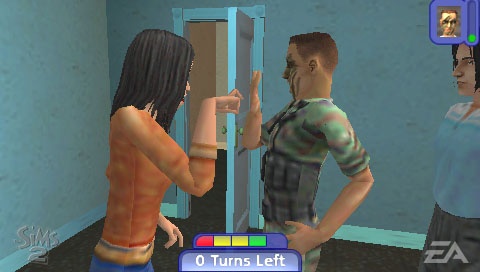Those little computer people known as The Sims have invaded nearly every video game platform there is since their debut in 1999 on the PC. Since then, the series has arguably been at its best on the PC, both in The Sims and The Sims 2, though the new PSP version does try new things and succeeds at several of them. Unfortunately, this new version of The Sims 2 has too many problems to be strongly recommended.

The PSP version of The Sims 2 doesn't attempt to reproduce all the complexity of the original PC game (and that's probably for the best). So, there's no DNA, sims don't have "memories" of what happens to them, and there's no aging, either. Instead, the new game reinterprets several of the series' features--for instance, it still lets you create a customized "sim" character with a specific personality and personal needs (or "motives," like hunger, boredom, and exhaustion) and with "aspirations," which are driving life goals that determine what kind of minor "want" goals will appear for them each day. However, the PSP game doesn't feature the PC game's "fears" (the opposite of wants)--instead, the game has a general "sanity" meter that fills up when you accomplish wants and that empties out when you fail. Also, the game includes an entirely new take on socializing. While the series has always emphasized character interactions (especially humorous ones between characters with different personalities), the PSP game uses a new timing-based minigame that requires you to match the abstract icons that accompany your neighbors' enthusiastic "simlish" gibberish speech.
But even though the PSP game makes the wise decision to not try to cram in everything from the original game, it does feature a surprising amount of continuity from the previous games. For instance, one of the first characters you meet in the game had mysteriously disappeared in the PC version of The Sims 2. Also, the entire PSP game takes place in Strangetown, an arid suburb modeled after Roswell, Arizona, where aliens, zombies, and other supernatural creatures terrorize the populace and make the locals a little "strange." In fact, your entire neighborhood is "strange"--you'll run into an inventor with a robot wife, get your car repaired at a disappearing garage, and encounter other weird happenings. The setting and humorous text dialogue you'll have with your neighbors do a really good job of setting the mood, as do the game's new collectible items: secrets, which you can find lying on the ground or through conversation and sell for in-game money. There are even minigames that make perfect sense, like the surprisingly fast-paced "whack-a-zombie" game that requires you to pummel zombies that try to rise from their graves with a shovel.
Unfortunately, these great new ideas are compromised by a number of issues that really get in the way of enjoying the game. The worst and most obvious problem with the game is the constant loading. Performing just about any action--going indoors or outdoors, playing a minigame, beginning a conversation with someone, ending a conversation with someone--causes the game to load for a good second or two. It's extremely jarring and completely disrupts the flow of the game, and it makes tasks like developing your house by designing it and buying new furniture much more tiresome than it should have been.
The Sims 2 for the PSP also has other minor issues, like how it handles skill increases. Like in previous games, your character has various skills (logic, cooking, mechanical, and so on) that can be improved with practice to make him or her better at certain tasks. In the PSP game, the way you improve them is to find a skill-increasing object, interact with it (which makes the game load), hammer on the circle button repeatedly until you earn a skill point, and then quit (which makes the game load). However, unlike previous games in the series, the PSP game doesn't offer any way to slow or speed up time, so you'll find it more difficult to manage your sim's time among minigames that are available only at certain hours, constant load times, and showers that seem to take forever to get your sims clean.

At least The Sims 2 for the PSP looks and sounds quite good. The colorful look of the original Sims 2 for the PC has mostly been carried over successfully to the PSP game, from the large, expressively animated characters to fabulous houses with tons of furniture. The PSP game has a new soundtrack based on the PC game's music that works quite well. There doesn't seem to be a huge variety of simlish gibberish speech (so you'll start to hear the same voice samples after a while). Also, for some reason, some characters' intonation and mannerisms don't match up with their dialogue (you'll occasionally see characters smile and make extravagant gestures when they're supposed to be angry or wave their arms angrily and shout when they're supposed to be happy), though for the most part, this looks and sounds like a Sims game.
It really is unfortunate that The Sims 2 for the PSP would end up with the technical issues it has, because aside from some other, minor issues, it really does have a lot of good gameplay ideas. Then again, it doesn't have any real multiplayer play (aside from letting you swap in-game secrets with your friends' PSPs), so once you're done with the single-player game, you'll be more or less done with the game, assuming the constant load times didn't cause you to quit first.